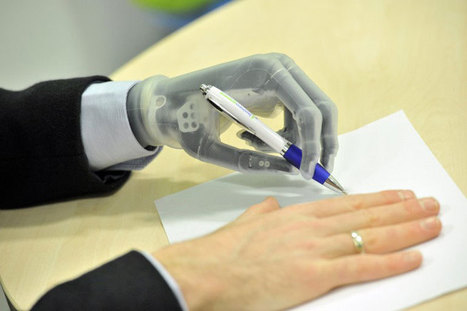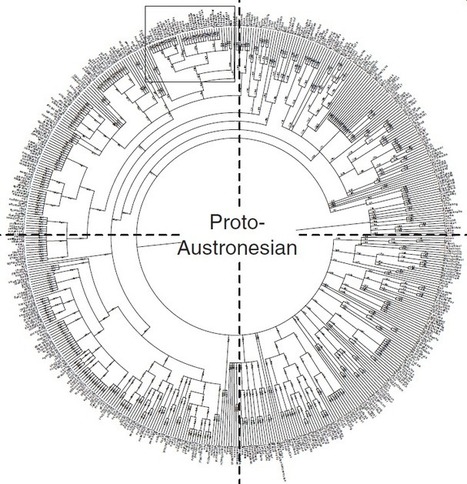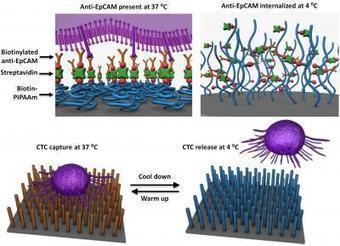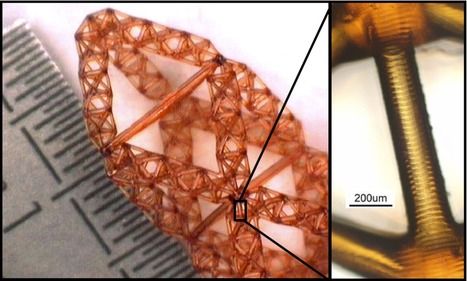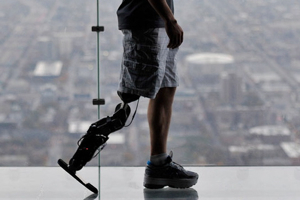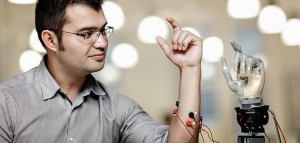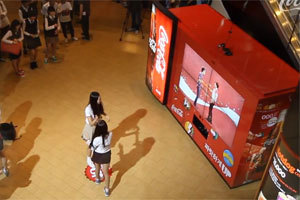This is the world's 1st app-controlled prosthetic hand, and it will change a lot of lives. The user can control the hand's movement with an iPhone/iPad app.
Get Started for FREE
Sign up with Facebook Sign up with X
I don't have a Facebook or a X account


 Your new post is loading... Your new post is loading...
 Your new post is loading... Your new post is loading...
Computer scientists have reconstructed ancient Proto-Austronesian, which gave rise to languages spoken in Polynesia, among other places (credit: A. Via Apmel
Leonard declares that the rise of smartphones and tablets represents the year's biggest transformative technology: "The decline of the PC is no longer subject to debate."
Researchers have developed a device that captures/preserves and releases cancer cells circulating in the bloodstream. This device has been developed by scientists from RIKEN Advanced Science Institute in Japan in collaboration with University of California Los Angeles and has been mentioned in the paper published online in the journal Advanced Materials.
This new device is a nanoscale Velcro-like device that can help not only in non-invasive diagnosis of cancer but also to study the mechanism involved in the spread of cancer in the body. With the help of this device doctors would be able to detect the cancer cells before their stay in the other organs. Moreover, the tumor cells would remain alive on the device, so the researchers would easily study them. Blood passes through the device as a filter and the tumor cells adhere to the small molecules and separate them with 40%-70% of efficiency. Temperature at 37 degrees Celsius helps scientists to keep the tumor cells in tiny temperature-responsive polymer brushes or the temperature cooled to 4 degrees Celsius helps them to release and examine the cells. Researchers wrote, “A platform for capture and release of circulating tumor cells is demonstrated by utilizing polymer grafted silicon nanowires. In this platform, integration of ligand-receptor recognition, nanostructure amplification, and thermal responsive polymers enables a highly efficient and selective capture of cancer cells. Subsequently, these captured cells are released upon a physical stimulation with outstanding cell viability.” “Until now, most devices have demonstrated the ability to capture circulating tumor cells with high efficiency. However, it is equally important to release these captured cells, to preserve and study them in order to obtain insightful information about them. This is the big difference with our device.” Hsiao-hua Yu, who led the team that developed the technology to coat the device with polymer brushes, said in a statement. Via Dr. Stefan Gruenwald 
Roberto Insolia's curator insight,
December 18, 2012 1:48 AM
Un innovativo micro-supporto consente di catturare singole cellule tumorali, libere nel sangue; è poi possibile liberarle, conservandole perfettamente integre, in modo da studiarne le caratteristiche a livello molecolare.
This video maps out Kurzweil's SIX EPOCHS OF EVOLUTION showing the exponential progression in the way the universe stores and processes information... what we see is a bootstrapping recursive complexification leading us towards some kind of intelligence singularity.
Created for Educational Purposes Only and non-commercial use by Jason Silva. Created to inspire.
Calculations show that the weight of large support structures can be dramatically reduced if their design consists of patterns that are the same at large scales as at the tiniest scales.
So glad to be able to share this! We, and by we I mean http://isthis.gd, built a MIDI orchestra for Grey London and Brother from old computer junk.
On November 4, Zac Vawter climbed 2,100 steps to the top of Chicago’s Willis Tower. Vawter made the climb on a prosthetic leg. Neither of these facts would be particularly notable but for one small item.
Check out our own Richard Lai go arms on with the Tokyo University of Science muscle suit. See more at: http://www.engadget.com/2012/10/02/tokyo-university-o...
Using location data gathered by personal mobile phones, researchers from Carnegie Mellon University have created the first map that tracks the spread of malaria by examining movement patterns among Kenya's population.
Microsoft recently unveiled a prototype of a mobile device called Digits, which, when worn on a user's hand, allows them to control computers and other equipment with a series of gestures
From
phys
Technology will put the power to make news into the hands of ordinary people and revolutionise the way the vast reservoir of the public's digital content is handled thanks to new research, funded by the Engineering and Physical Sciences Research Council (EPSRC). Multisource audio-visual production from user-generated content' is led by Professor Andrea Cavallaro who is based at the School of Electronic Engineering & Computer Science, Queen Mary University of London and starts in October 2012 |
Engineers have improved on the original and groundbreaking brain-computer interface by creating a wireless device that has successfully been implanted into the brains of monkeys and pigs.
From
vimeo
A video info graphic that compares the internet today to 10 years ago.
Can cells become little computers? And how does technological progress challenge our ideas about free will, intelligence, and the purpose of human life? Martin Eiermann sat down with the computer scientist Stephen Wolfram to discuss these questions. Via Andrea Graziano
Sakis Koukouvis's insight:
Can cells become little computers?
'The future is now, it’s not a fetishistic obsession or architectural style. Building a city for 2050 should have started 50 years ago – we’re already late for managing our human investments, so le... Via addkerberos
A postdoctoral student has developed a technique for implanting thought-controlled robotic arms and their electrodes directly to the bones and nerves of amputees, a move which he is calling "the future of artificial limbs." The first volunteers...
Early humans may not have needed to continuously reinvent the proverbial wheel. A newly discovered cache of stone tools representing 11,000 years of human habitation suggests that perhaps human innovations didn't flicker in and out of early human history as once suspected, driven into obscurity by external pressures such as climate change. Instead, researchers suggest, at least some ancient humans apparently managed to pass an innovative type of stone tool down to their descendants.
A dam unearthed during excavation work in the northern Anatolian province of Çorum reveals that the dam construction techniques of the ancient past are similar to the techniques used today, according to archaeologists. 
Shannon Bench's curator insight,
October 18, 2013 9:24 PM
Of course! They were the Hattians! THEY RULE!
According to the news site RocketNews24, the Japanese company Chaku Perfume has "developed a new communication service in the way of an iPhone application and device called “Chat Perf,” which can send smells across cyber space. Amazing!"
Eye scanners have always been one of the security devices people think of when they think "high-tech" and "high security." But they're not perfect yet, some can be fooled with contacts or even pictures, but new pushes into detecting your personal eye jiggle could change that.
John Maeda, President of the Rhode Island School of Design, delivers a funny and charming talk that spans a lifetime of work in art, design and technology, concluding with a picture of creative leadership in the future. Watch for demos of Maeda's earliest work -- and even a computer made of people.
Advertising shticks have come a long way, especially for companies like Coca-Cola. In an effort to retain its position as the number 1 global brand, the company has recently equipped vending machines with webcams and Microsoft Kinect sensors. |


